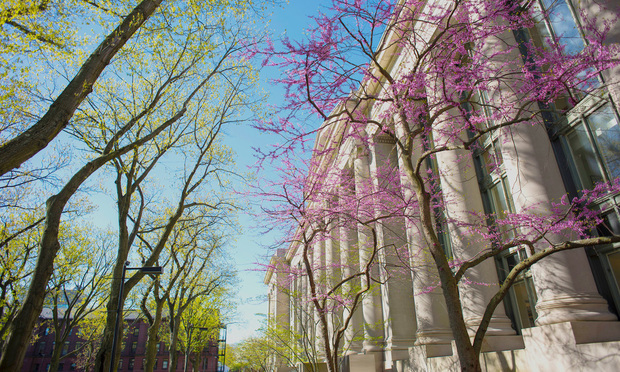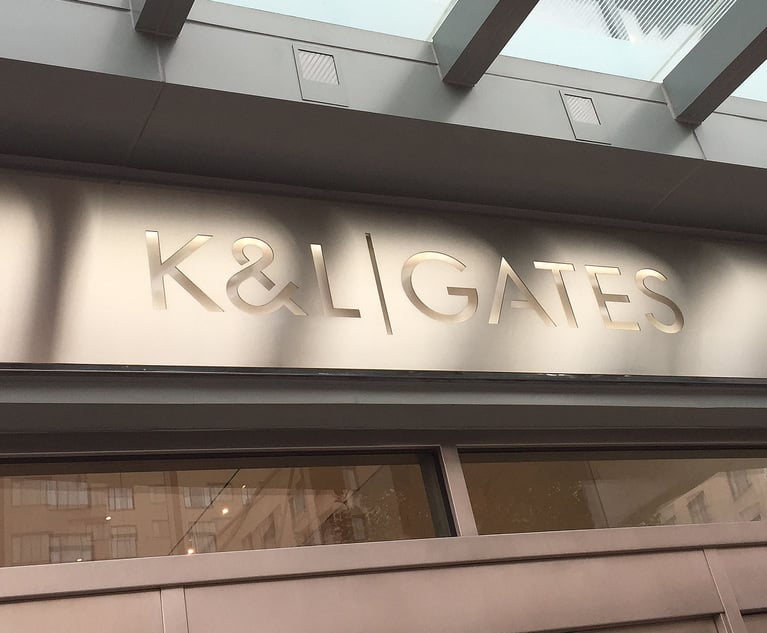How the Recession Forced Law Schools to Reimagine Their Role in Students' Careers
As the recession rattled law schools and graduates, schools were forced to get more creative, leading to changes that have endured.
June 24, 2019 at 05:30 AM
7 minute read
 Harvard Law School
Harvard Law School
Melissa Lennon keeps a thick file labeled "Deferrals, Rescinded Offers, Firms Dissolving" in her office in the career services suite at Temple University James E. Beasley School of Law.
Lennon took over the school's career services operation in 2008—shortly before the failures of Bear Sterns, Lehman Brothers and AIG threw the U.S. economy deeper into the worst recession in recent memory. The file is a sobering chronicle of the effect of the financial crisis on the legal employment market, noting which firms were laying off associates, which were clawing back the associate job offers they had made to recent graduates and which were closing up shop altogether. Lennon tracked the grim news in real time as she and her career services colleagues across the country scrambled to react to the dramatic contraction of the legal job market and find new and creative ways to help graduates find work.
Career services staff also found themselves thrown into the role of therapist.
"There were definitely crying people. And there were a lot of angry people," recalls Lois Casaleggi, senior director of career services at the University of Chicago Law School. "They weren't angry at the law school, but they were angry at the whole industry and the situation. When they made the decision to go to law school, this wasn't on the table."
The number of entry-level legal jobs fell more than 23% between 2007 and 2018. Entry-level associate hiring by law firms plunged 40% in 2009 alone and has yet to return to its prerecession level. Big Law—and the elite schools that send graduates to those large firms—were hit the hardest. But the recession created a trickle-down phenomenon that touched regional, mid-tier and lower-tier schools as well.
 Melissa Lennon, assistant dean for career services at Temple University Beasley School of Law.
Melissa Lennon, assistant dean for career services at Temple University Beasley School of Law."Within our class and within our Philadelphia legal community, the people who would normally go into Big Law went to medium law," Lennon says, noting that about one-fifth of the school's graduates typically are hired by large firms. "And the people who would normally go into Medium Law went to Small Law. Then the Small Law people were left with the gig economy jobs, cobbling things together. That ripple effect lasted for years."
Law schools had weathered economic downturns before, but the scope of the 2008 recession presented new challenges. More law students and graduates than ever were seeking work, and the speed at which law firms shed jobs and rolled back hiring was staggering.
The impact of the recession was keenly felt for at least three years. Many members of the classes that graduated in 2008 and 2009 saw their permanent associate job offers deferred or rescinded, meaning they could not start their firm jobs for a year or more after expected, if at all. Meanwhile, the class of 2010 was in the middle of the 2008 summer associate on-campus recruiting process when the bottom fell out of the economy. Schools on the tail end of the interview season were left out in the cold.
At Harvard Law School, which in 2008 held its interview program in October, about one-third of scheduled recruiters canceled before ever setting foot on campus that year, Mark Weber, assistant dean for career services, says. On the flip side, Northwestern University Pritzker School of Law had already completed its on-campus interview program before the financial collapse. The number of students who got summer associate offers that year was roughly comparable to previous years—though those offers became tinged with uncertainty.
While 2008 and 2009 were chaotic, it was the law classes of 2010 and 2011 that had the worst of it, according to many in career services. The widespread hiring deferrals of the previous two years meant firms had little capacity for new hires.
"The best way to think about it is with an airline when your flight gets canceled," Weber says. "It's sunny the next day, but you can't get out of the airport because they're working through all the backlog. That's what happened. Expectations had to be managed a little bit, and students had to cast a wider net."
 Lois Casaleggi, senior director of career services at The University of Chicago Law School.
Lois Casaleggi, senior director of career services at The University of Chicago Law School.Career services offices were forced to think outside the box to find ways to help graduates and students whose career plans were upended. They encouraged legal departments, government and public interest employers to temporarily take on deferred associates while they waited to start their firm jobs. They asked alumni to help students find work. They created website portals for deferred and laid-off associates. They reached out to alumni at firms undergoing layoffs to check their status and offer support.
But schools weren't initially staffed to handle the sudden volume of alumni who were returning to campus asking for career help, as they traditionally focus on entry-level employment. They were forced to quickly ramp up their career support offerings for alumni. A number of schools, including Harvard and Northwestern, have since hired a dedicated, full-time staff person to assist alumni.
"I suspect it was in the works and generationally changing with people changing jobs more, but it was accelerated by the drama of so many young alumni being out of work all at once," James Leipold, executive director of the National Association for Law Placement, says of dedicated alumni career counseling
The recession was also the catalyst for the rise of so-called school-funded jobs, in which schools themselves funded temporary positions for their graduates. Most of the jobs were legal in nature, though not all, sparking criticism of the practice. In 2011, nearly 5% of entry-level law jobs were funded by schools. That figure has since fallen below 2%. Still, more schools today offer public interest fellowships, in part because those opportunities, born of the recession, proved popular. The practice of judges hiring clerks with one or two years of experience also accelerated as a result of the recession, Weber notes, as clerkships became a refuge for some deferred or laid-off attorneys at the time.
Despite the efforts of career services offices to respond to the increased demand for help, the recession was a time of real struggle for many young lawyers. It was not uncommon for Temple graduates to cobble together a patchwork of opportunities while awaiting full-time work, Lennon says. Perhaps they would work 15 to 20 hours a week doing hourly contract work at a law firm, then volunteer for a judge and take on pro bono work to fill in their week.
"It was kind of a gig economy situation," she says. "We didn't call it that then, but that's what it really was."
The recession took an emotional toll on career services personnel as well, as Northwestern career services dean David Diamond recalls.
"It was just heartbreaking," Diamond says. "These are people we really came to know and respect as we advised them as students. Now they were either about to launch their careers or in the early stages of their careers, and to watch their dreams shift so quickly—often without warning—was pretty awful. We do this job because we care and we want to see people succeed. To see market forces take that away from them was really hard."
Email: [email protected]
This content has been archived. It is available through our partners, LexisNexis® and Bloomberg Law.
To view this content, please continue to their sites.
Not a Lexis Subscriber?
Subscribe Now
Not a Bloomberg Law Subscriber?
Subscribe Now
NOT FOR REPRINT
© 2025 ALM Global, LLC, All Rights Reserved. Request academic re-use from www.copyright.com. All other uses, submit a request to [email protected]. For more information visit Asset & Logo Licensing.
You Might Like
View All
Dechert Partners With Wharton School for Associate-Level Business Training Program

Law Firms Are Turning to Online Training Platforms as Apprenticeship Model Falters

K&L Gates Partners With AltaClaro to Offer Gen AI Supervisory Course for Firm Partners and Managers
6 minute read
Norton Rose Fulbright's New Houston Office Features Views of Urban Park
3 minute readTrending Stories
Who Got The Work
J. Brugh Lower of Gibbons has entered an appearance for industrial equipment supplier Devco Corporation in a pending trademark infringement lawsuit. The suit, accusing the defendant of selling knock-off Graco products, was filed Dec. 18 in New Jersey District Court by Rivkin Radler on behalf of Graco Inc. and Graco Minnesota. The case, assigned to U.S. District Judge Zahid N. Quraishi, is 3:24-cv-11294, Graco Inc. et al v. Devco Corporation.
Who Got The Work
Rebecca Maller-Stein and Kent A. Yalowitz of Arnold & Porter Kaye Scholer have entered their appearances for Hanaco Venture Capital and its executives, Lior Prosor and David Frankel, in a pending securities lawsuit. The action, filed on Dec. 24 in New York Southern District Court by Zell, Aron & Co. on behalf of Goldeneye Advisors, accuses the defendants of negligently and fraudulently managing the plaintiff's $1 million investment. The case, assigned to U.S. District Judge Vernon S. Broderick, is 1:24-cv-09918, Goldeneye Advisors, LLC v. Hanaco Venture Capital, Ltd. et al.
Who Got The Work
Attorneys from A&O Shearman has stepped in as defense counsel for Toronto-Dominion Bank and other defendants in a pending securities class action. The suit, filed Dec. 11 in New York Southern District Court by Bleichmar Fonti & Auld, accuses the defendants of concealing the bank's 'pervasive' deficiencies in regards to its compliance with the Bank Secrecy Act and the quality of its anti-money laundering controls. The case, assigned to U.S. District Judge Arun Subramanian, is 1:24-cv-09445, Gonzalez v. The Toronto-Dominion Bank et al.
Who Got The Work
Crown Castle International, a Pennsylvania company providing shared communications infrastructure, has turned to Luke D. Wolf of Gordon Rees Scully Mansukhani to fend off a pending breach-of-contract lawsuit. The court action, filed Nov. 25 in Michigan Eastern District Court by Hooper Hathaway PC on behalf of The Town Residences LLC, accuses Crown Castle of failing to transfer approximately $30,000 in utility payments from T-Mobile in breach of a roof-top lease and assignment agreement. The case, assigned to U.S. District Judge Susan K. Declercq, is 2:24-cv-13131, The Town Residences LLC v. T-Mobile US, Inc. et al.
Who Got The Work
Wilfred P. Coronato and Daniel M. Schwartz of McCarter & English have stepped in as defense counsel to Electrolux Home Products Inc. in a pending product liability lawsuit. The court action, filed Nov. 26 in New York Eastern District Court by Poulos Lopiccolo PC and Nagel Rice LLP on behalf of David Stern, alleges that the defendant's refrigerators’ drawers and shelving repeatedly break and fall apart within months after purchase. The case, assigned to U.S. District Judge Joan M. Azrack, is 2:24-cv-08204, Stern v. Electrolux Home Products, Inc.
Featured Firms
Law Offices of Gary Martin Hays & Associates, P.C.
(470) 294-1674
Law Offices of Mark E. Salomone
(857) 444-6468
Smith & Hassler
(713) 739-1250









